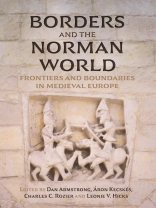Study of the Norman World’s borders, frontiers, and boundaries in Europe, shedding fresh light on their nature and extent.
The Normans exerted great influence across Christendom and beyond in the eleventh and twelfth centuries. Figures like William the Conqueror and Robert Guiscard subdued vast territories, their feats recorded for posterity by chroniclers such as Orderic Vitalis and Geoffrey Malaterra. Through travel and conquest, the Normans encountered, created, and conceptualised many borders, with the areas of Europe that they ruled and most affected often being grouped together as the ‘Norman World’.
This volume examines the nature, forms, and function of borders in and around this ‘Norman World’, looking at Normandy, the British-Irish Isles, and Southern Italy. Three sections frame the collection. The first concerns physical features, from broad frontier expanses, to rivers and walls that were both literally and metaphorically lines of division. The second shows how borders were established, contested, and negotiated between the papacy and lay rulers and senior churchmen. Finally, the third highlights the utility of conceptual frontiers for both medieval authors and modern historians. Among the subjects covered are Archbishop Anselm’s travels across Christendom; the portrayal of borders in the writings of William of Jumièges, Orderic Vitalis, and Gerald of Wales; and the limits of Norman seigneurial and papal power at the edges of Europe. Overall, the essays demonstrate the role that the manipulation of borders played in the creation of the ‘Norman World’, and address what these borders did and whom they benefited.
Tabla de materias
Introduction: Writing the Borders of the Norman World
Dan Armstrong and Áron Kecskés
PART I: Borders In and Around the Norman World
1. Ireland and the Anglo-Normans within the Irish Sea World: Rebels, Mercenaries, Allies 1066-1169
Caitlin Ellis
2. The Northern Limits of Norman Power: Border Policies in Northumbria,
c. 1050-1100
Chelsea Shields-Más and Charles C. Rozier
3. Controlling an Unstable Boundary: The Normans and their Continental
Border Areas, 911-1135
Astrid Lemoine-Descourtieux
4. Boundary-making in the Beneventano in the early Twelfth Century
Áron Kecskés
PART II: Ecclesiastical Borders
5. Alexander II and the Normans: Borders as Instruments of Dialogue
and Compromise
Maria Vezzoni
6. Gregory VII, Lanfranc, and Ireland: Papal Relations at the Periphery
Dan Armstrong
7. ‘…
a mari Barensi usque ad mare Bononiense’: Crossing Borders. The Travels of Archbishop Anselm of Canterbury,
libertas ecclesiae, and the Uses of Clerical Mobility in an Age of Reform
William M. Aird
8. Temporal and Spiritual Power in Norman Sicily: An Unreal Border?
Ignazio Alessi
9. The Crossing of Borders: The Legations of John of Crema, 1124-1125
Callum A. Jamieson
PART III: Conceptual Boundaries
10. The Very Idea of a Border in Britain
Emily A. Winkler and Nia Wyn Jones
11. Norman Borders in the Work of William of Jumièges and Orderic Vitalis,
c. 1057-1141
Mark Hagger
12. Is there a ‘Norman’ Historiography of the Conquest of Southern Italy?
Marie-Agnès Lucas-Avenel
13. The Lion, the Camel, and the
Cassa of Terracina: Transfer and Exchange on the Borders of Norman Italy
John Aspinwall
Afterword: Borders, Landscapes, and Seascapes
Leonie V. Hicks
Select Bibliography
Index
Sobre el autor
EMILY A. WINKLER is a Fellow of St Edmund Hall and member of the History Faculty at the University Oxford.












